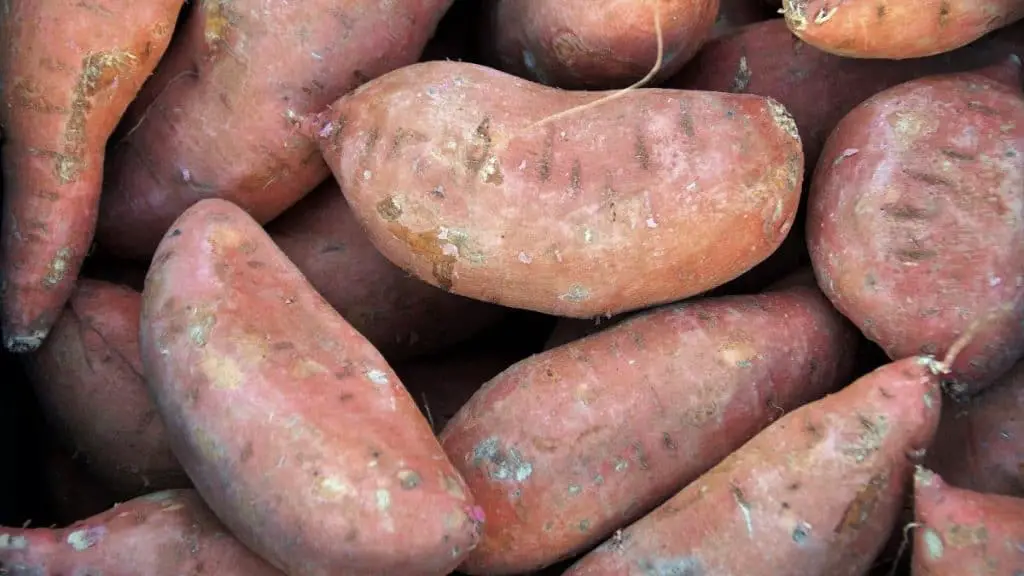Skip To Section
Can Horses Eat Sweet Potatoes?
Yes, horses can definitely eat sweet potatoes! Sweet potatoes are perfectly safe for your horse in all of their forms. Cooked, raw, peeled, or unpeeled, sweet potatoes are a tasty, fibrous snack for horses that they are sure to love.

Just like humans, horses crave variety. When your horse begins to tire of the normal apples, horse feed, and mixed greens, sweet potatoes are a great addition to their diet that can provide all different kinds of nutrients while still being super tasty.
In this article we will discuss everything you need to know about feeding your horse sweet potatoes, the best way to prepare them for your horse, and if the whole sweet potato plant is safe for your horse to ingest.
What Are The Benefits Of Feeding Sweet Potato To Horses?
Sweet potatoes have numerous benefits as part of a well-balanced horse diet. They provide a ton of fiber, are full of vitamins and minerals, and have even shown the ability to help heal ulcers.
Fiber In Sweet Potatoes
Fiber helps immensely with digestive health in horses. If your horse isn’t getting enough fiber in their diet, then they are sure to have bowel problems, especially constipation.
Sweet potatoes have around 4 grams of fiber per serving and are a great way to keep your horse’s digestive system regulated and prevent constipation.
Vitamins And Minerals In Sweet Potatoes
Paying attention to the number of vitamins and minerals your horse is getting through their diet is an important part of horse ownership.
It can be difficult to perfectly balance all the different parts of your horse’s diet to maximize health benefits, but sweet potatoes can make all that diet planning a little easier.
Sweet potatoes are full of all kinds of different vitamins and minerals that are beneficial to horses!
Some of those vitamins and minerals include:
- Vitamin A – strengthens bones and boosts immune systems.
- Vitamin C – Boosts immune systems and helps in healing.
- Vitamin B5 –Encourages a healthy coat.
- Vitamin B6 – Encourages joint, eye, and mental health.
- Vitamin E – Helps to ward off infection and keeps eyes and coats healthy.
- Potassium – Imperative for muscle growth and to prevent muscle fatigue.
- Manganese – Helps to regulate blood sugar.
Sweet Potatoes And Gastric Ulcers
Gastric ulcers are an unfortunate condition that a large number of horses suffer from. If a horse does not get a well-balanced diet, these ulcers can form in their stomachs and cause them a lot of pain and discomfort.
Sweet potatoes have been found to help soothe stomach ulcers in horses while also promoting healing. If your horse is suffering from gastric ulcers, add some sweet potato to their diet to get some relief.
Always talk to your veterinarian when coming up with any treatment plans for your horse.
Risks Of Feeding Sweet Potatoes To Horses
While sweet potatoes are a wonderful addition to a horse’s diet, moderation is important for any food.
Overfeeding sweet potatoes can lead to problems like obesity, insulin resistance, and laminitis.
Obesity From Sweet Potatoes
Sweet potatoes are full of carbohydrates, starches, and sugars, which are vital parts of a horse’s diet.
Unfortunately, starchy foods full of sugar can easily pack the pounds on a horse if eaten in excess.
Obesity is especially hard on horses. Joints are particularly vulnerable to injury in an obese horse.
Carefully balancing things like carbohydrates can help avoid obesity, which means that sweet potatoes should only make up a small part of your horse’s daily meals.
Insulin Resistance From Sweet Potatoes
While rare, horses can develop insulin resistance from ingesting too much sugar. Sweet potatoes contain quite a bit of sugar, which is why it’s important to regulate the number of sweet potatoes your horse consumes.
Insulin resistance occurs when a horse’s body develops a reduced sensitivity to insulin. Insulin is a hormone produced by the pancreas to help regulate sugar, also known as glucose, in the body.
This reduced sensitivity causes more insulin to be produced, with is detrimental to the horse’s health.
Laminitis From Sweet Potatoes
Laminitisis a painful condition of the sensitive laminae structures in the hoof of a horse caused by a disruption of blood flow to the laminae. These laminae are made of soft connective tissue that can easily become swollen and irritated.
Obesity, sudden ingestion of large amounts of sugars and starches, and high levels of insulin have all been linked to cases of laminitis.
Since sweet potatoes are sugary, starchy foods they should be fed in careful moderation to help avoid laminitis.
Raw Sweet Potatoes VS Cooked Sweet Potatoes
Now that we’ve established that sweet potatoes are a healthy and beneficial part of a horse’s diet when fed in moderation, you may be wondering, are raw or cooked sweet potatoes better for a horse?
Both raw and cooked sweet potatoes have their benefits for horses.
Raw Sweet Potatoes
If you’re looking for the healthiest way to feed your horse sweet potatoes, then raw is the way to go.
These tasty orange horse treats are at their most nutritious when raw.
Cooking sweet potatoes breaks down some of their nutrients, making cooked sweet potatoes a little less nutritionally dense.
Feeding your horse a sweet potato raw is way easier than bothering to cooking sweet potatoes too, so save yourself some effort and skip the cooking!
Cooked Sweet Potatoes
Even though cooked sweet potatoes don’t have all the same nutritional benefits, they still have their uses!
Older horses, or those that are missing teeth, are going to have a much easier time eating soft-cooked sweet potatoes.
While they may have lost some nutrients when cooked, they don’t lose them all! Cooked sweet potatoes are still an awesome treat for your horse, especially those with dental problems.
Can Horses Eat Sweet Potato Peelings?
Yes! Horses can eat sweet potato peelings.
In fact, sweet potato peelings have almost twice as many antioxidants as the flesh of the fruit and contain a huge amount of fiber!
Horses also love eating the peel. Go ahead and roughly chop a sweet potato for your horse and let them enjoy their healthy treat without having to worry about all that tedious peeling.
Can Horses Eat Sweet Potato Leaves Or Vines?
The sweet potato itself may be a safe treat for your horse, but there isn’t a ton of research on whether the leaves and vines of the sweet potato plant are safe for horses to consume.
There is no research suggesting the leaves and vine are toxic to horses, but seeing as regular potatoes and their leaves and vines can be problematic to horses, there is always the possibility the sweet potato leaves and vines could be problematic as well.
Since there is no definitive answer, avoid feeding your horse the sweet potato leaves and vines. It isn’t worth the potential risk.
Are Sweet Potatoes Poisonous To Horses?
Sweet potatoes are NOT poisonous to horses. When fed in small quantities, sweet potatoes are a tasty and healthy addition to a horse’s diet.
Sweet potatoes, like any other food, shouldn’t be fed in large amounts. Since they are so starchy and have high sugar content, too many sweet potatoes can be harmful to a horse’s digestive system and endocrine system.
In proper serving sizes, sweet potatoes are beneficial and a favorite treat of many horses!
Are Regular Potatoes Toxic To Horses?
On the other hand, regular potatoes ARE toxic to horses. Potatoes, a member of the nightshade family, are toxic to horses, especially in large amounts, and should never be fed as part of a regular diet.
All members of the nightshade family, like peppers and tomatoes, are terrible for horses. If a horse ingests a small amount of potato, it’s unlikely any real damage will occur, but when possible it’s still best to avoid any situations where your horse may eat regular potatoes.
The reason sweet potatoes are alright for horses while regular potatoes are toxic is that they are, surprisingly, only distantly related.
Sweet potatoes are not part of the nightshade family. Instead, they are in the morning glory family, making them safe for horses.
Even though potatoes may seem like a cheap and filling option for your horse’s diet, and aren’t likely to hurt a horse in small quantities, it’s still better to be safe than sorry. Don’t feed horses regular potatoes.
In Conclusion
All in all, sweet potatoes are a great choice for horse owners to add to a balanced diet. They contain healthy vitamins, minerals, and fiber.
Like other treat foods, sweet potatoes should be fed in careful moderation. Sweet potatoes are full of starch, carbohydrates, and sugar, which are fine for horses in small amounts but can cause a multitude of problems in excess.
Raw and cooked sweet potatoes are both good for horses to enjoy, but since much isn’t know about sweet potato leaves and stems, they should be avoided.
Lastly, don’t confuse regular potatoes with sweet potatoes when feeding your horse. Regular potatoes can be toxic to horses!
With all this information, you can chop up some fresh sweet potato for your beloved horse and be confident that you’re making a safe, healthy choice when it comes to what foods to feed them!
